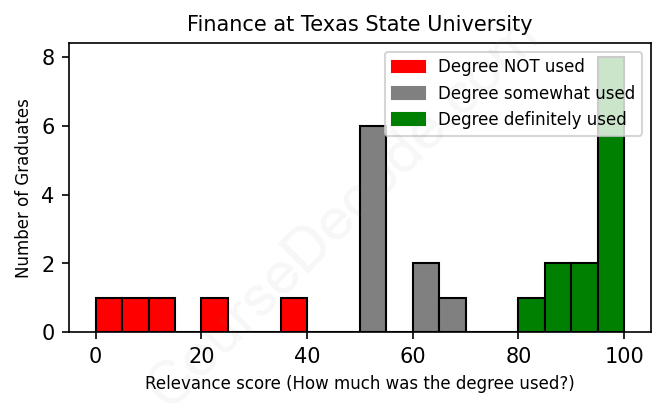
First, some facts. Of the Finance graduates from Texas State University we've analyzed , here's how many have used (or NOT used) their degree in their career:

These are estimates based on AI analysis of 27 LinkedIn profiles (see below).
The verdict? Slightly below average. Overall, with an average relevance score of 66%, Finance graduates from Texas State University have a slightly lower likelihood (-1%) of finding work in this field compared to the average graduate across all fields:
And for comparison, here's the chart for all profiles we've looked at across all degrees.
Also, after graduating, only 11% of these graduates have pursued further education other than another Bachelor's degree (such as a Masters degree or other), compared to the average across all profiles of 35%. This suggests a Bachelors degree is enough for most Finance graduates, and it's normal to look for work straight after graduation.
See the details:
|
Relevance score: 50% We think this person has gone into a career only somewhat relevant to their degree. We think this person has gone into a career only somewhat relevant to their degree.
DEGREE INFOGraduated in 2018 from Texas State University with a Bachelor of Applied Science - BASc in Finance. No other secondary education since. JOB HISTORY SINCE GRADUATIONDirector of Food And Beverage DoubleTree by Hilton Oct 2018 - Mar 2020 Assistant Food & Beverage Manager  The Driskill Hotel Jan 2024 - Present ABOUTNo information provided. |
The top 10 most common jobs done by the graduates we've analyzed (ranked most common to least) are:
Here is a visual representation of the most common words in job titles for Finance graduates (this is across all Finance graduates we've analyzed, not just those who went to Texas State University):

Looking at the career trajectories of finance graduates from Texas State University, it seems like many of them have embarked on pretty solid paths right after graduation. Typically, their first jobs involve roles like bankers, financial analysts, or positions related to credit and lending, often at well-known companies in the finance sector like Wells Fargo and Fidelity Investments. These initial roles seem to lay a good foundation in finance principles and important operational skills, allowing graduates to build experience quickly as many of them move up within their organizations or transition into related jobs fairly quickly.
Fast forward five or ten years, and you'll find a mix of outcomes. A lot of graduates continue climbing the corporate ladder, taking on managerial or higher-level finance roles, like VP of Finance or Director of Finance at various firms. Some even seem to branch out into entrepreneurship or other fields, while others have remained within the financial sector, shifting roles but maintaining a focus on finance-related positions. However, there are a few who seem to have strayed away from finance completely, taking up various roles that don't quite align with their degree. Overall though, it’s clear that many Texas State finance alums are finding successful and relevant careers post-graduation, making this program a solid choice for those looking to enter the finance field.
Getting a Bachelor’s degree in Finance, whether at Texas State University or elsewhere, can be a mixed bag in terms of difficulty. Generally, it balances a solid amount of quantitative skills like math and statistics with some theory and real-world applications, so if you’re not a numbers person, it might be a bit tough. The workload can be pretty heavy, especially in core courses like financial analysis and corporate finance, but a lot of students find it manageable if they stay organized and seek help when needed. Overall, it's not the easiest degree out there, but if you have an interest in the subject and put in the effort, you should be able to navigate it just fine!
Most commonly, in the LinkedIn profiles we've looked at, it takes people 4 years to finish a Bachelor degree in Finance.
Looking at the finance graduates from Texas State University, it seems like many of them have landed decent-paying jobs, especially those with a few years of experience under their belts. For instance, the ones who began in roles like credit analysts or financial managers have worked their way up to higher positions, like VP and Director levels at their companies, which usually come with pretty good salaries. Even the folks who graduated more recently are starting their careers in companies like Dell and Fidelity, both of which are known for competitive pay. However, there are a few cases, particularly among graduates with less experience or those taking on more entry-level roles, where the salaries might be on the lower side. Overall, it looks like a solid career track for most of them, but as with any field, there are varying degrees of success and pay depending on the path taken.
Here is a visual representation of the most common words seen in the "about" section of LinkedIn profiles who have a Bachelor degree in Finance (this is across all Finance graduates we've analyzed, not just those who went to Texas State University). This may or may not be useful:

Here are all colleges offering a Bachelor degree in Finance (ordered by the average relevance score of their Finance graduates, best to worst) where we have analyzed at least 10 of their graduates: